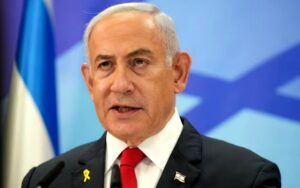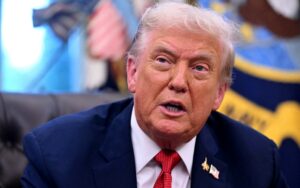Xi Jinping elected general secretary of the Chinese Communist Party for a third term

The Chinese President Xi Jinping on Sunday secured a historic third term at the head of the Communist Party, the official news agency reported, after removing any opposition in the country and within the party ranks, making him the most powerful leader of China since the founder of the Mao regime. Zedong.
The new Central Committee of the Communist Party, after extensive amendments, appointed Xi Jinping for a third term of five years, which paves the way for him to be officially installed at the head of state for a new term in March 2023.
Upon receiving a new five-year mandate from the new Central Committee, Xi pledged to “work hard to fulfill our tasks”.
Xi, who has chaired China for a decade, arrived at the podium on Sunday, followed by the six other members appointed to the Politburo Standing Committee, the body that holds the actual power, all of whom are close allies and allies.
Xi “sincerely thanked the entire Party for the confidence they have shown in me”.
“China cannot develop without the world, and the world also needs China,” Xi, who was also appointed to a new term at the head of the Chinese armed forces, declared in a speech to the press at the People’s Palace.
Within a decade, Xi succeeded in transforming China into the second economic power in the world and creating an army that is one of the most powerful in the world.
“After more than forty years of unremitting efforts for reform and opening up, we have achieved two miracles: rapid economic development and long-term social stability,” he stressed.
Despite the concentration of the authorities almost completely in his hands, the president is facing a strong economic slowdown, especially as a result of his “zero Covid” policy, with its continuous closure and quarantine measures, the exacerbation of differences and rivalry with the United States and international criticism on the level of human rights.
The Communist Party concluded its twentieth conference on Saturday, after a week of deliberations in closed sessions, with the renewal of 65% of the members of the Central Committee, which is considered an internal parliament for the party, according to AFP estimates.
During their first meeting on Sunday morning, the 205 Central Committee members, including only 11 women, the 25 representatives of the Politburo, appointed the CPC’s decision body.
For the first time in 25 years, the Politburo doesn’t include any women, succeeding San Chunlan, the only woman among the former bureau’s retired members.
On Sunday morning, the Politburo appointed the new Standing Committee, the body that holds de facto power in China.
The new Standing Committee, led by Xi Jinping, is composed exclusively of close allies of the Secretary-General.
Shanghai’s party chief Li Qiang appears to be the next prime minister, despite his chaotic administration of the prolonged lockdown imposed on the city last spring.
He will succeed Li Keqiang, who will retire.
The new standing committee confirms Xi Jinping’s dominance of political power, according to analysts.
“They are all Xi’s men,” said Alfred Wu Mulwan, an expert on Chinese politics at the National University of Singapore.
“It shows that he intends to rule for longer than a third term” and thus beyond 2027.
Willy Lam, an expert on Chinese Communist Party matters at the Chinese University of Hong Kong, predicted “the unusually unequal dominance of one faction, that of Xi Jinping”.
Far from the apparent homogeneity, the Chinese Communist Party is internally divided into several antagonistic currents, according to experts on China affairs.
So far, settlements have been made over the distribution of positions, the most prominent example of which is the appointment of Xi Jinping himself.
With no consensus being reached on a candidate in 2012, the various factions of the party eventually appointed him as the consensus candidate.
Later, however, he surprised everyone by removing his opponents to gradually seize all power at the head of the party and the country, severely suppressing any opposition.
By securing a third term at the head of the party, Xi secured a third presidential term next March.
Seeking to stay in power, Xi in 2018 amended the constitution to abolish the two-term limit imposed on the president.
At the conclusion of the congress, the Communist Party on Saturday affirmed the “pivotal position” of Xi Jinping.
The ceremony, which took place according to a well-prepared scenario, was punctuated by an unexpected incident, as the reformist former president Hu Jintao was taken Saturday outside the hall, according to AFP journalists.
Staff urged Hu, the 79-year-old who presided over China from 2003 to 2014, to get up from his seat next to Xi’s and force him out of the hall.
After a long silence from the official media in this regard, the New China Agency confirmed that Hu Jintao “wasn’t well”.
“Hu Jintao insisted on attending the closing ceremony… Even though he needed time to finally recover,” the agency wrote on Twitter, despite the site being blocked in China.
“When he felt that he wasn’t well during the session, his team escorted him to an adjacent hall to rest… He is much better now”.
It appears that any mention of the reformist ex-president has recently been blocked from the Chinese Internet.







